Emma has placed her doll Flora against the pillow. She says, "Now, dear Flora, I want you to be very good to-morrow, for I am to have company. It is my birthday."
Title: The Nursery, October 1877, Vol. XXII. No. 4
Author: Various
Release date: February 20, 2009 [eBook #28138]
Language: English
Credits: Produced by Emmy, Juliet Sutherland and the Online
Distributed Proofreading Team at http://www.pgdp.net. Music
by Linda Cantoni.

| PAGE | |
| The Parrot that played Truant | 97 |
| Feeding the Ducks | 100 |
| Chestnut-Gathering | 104 |
| A Day with the Alligators | 107 |
| The Spider and her Family | 110 |
| Why Uncle Ralph did not hit the Deer | 113 |
| Faithful Dandy | 114 |
| Emma and her Doll | 117 |
| Our old Billy | 119 |
| The Thrush feeding the Cuckoo | 120 |
| The Cat and the Starling | 125 |
| PAGE | |
| A Baby Lay | 101 |
| The Pigs | 106 |
| How to draw a Goose | 112 |
| Learn your Lesson | 116 |
| Jippy and Jimmy | 122 |
| The jolly old Cooper | 123 |
| The Express Package | 126 |
| The White Owl (with music) | 128 |
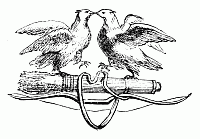
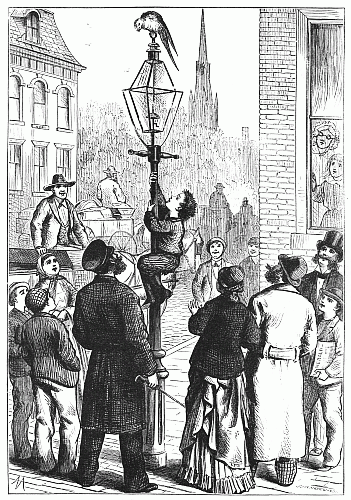 THE PARROT THAT PLAYED TRUANT.
THE PARROT THAT PLAYED TRUANT.
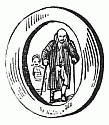
But one day, when the window was open, and the door of the cage was open also, Polly thought it was a good time to play truant. So she hopped out, rested on the sill a moment, and then flew into the street, from tree to tree, and from lamp-post to lamp-post.
Poor Miss Dorothy was in despair. How should she get back her lost pet? She called in a policeman, and he advised her to get out a handbill, offering a reward. So in an hour this notice was pasted on the walls near by:—
LOST!—A green-and-white parrot. It answers to the name of Polly, and can talk quite plainly. It says, "Boy, go away!" also, "Polly wants a cracker," and "No, you don't!" Any one finding this bird shall, on returning it to its afflicted owner, Miss D. Draper, No. 10, Maiden Place, receive a reward of two dollars.
Little Tony Peterkin was walking home from school, and wishing he had money enough to buy a copy of Virgil without going to his mother for it,—for she was a widow, and poor,—when he saw a man pasting this handbill on a wall. Tony read it, and said aloud, "Oh, I wish I could find that parrot!"
A girl who heard him said, "I saw a parrot just now on one of the trees in Lake Street."—"Did you?" said Tony; and off he ran. The parrot had flown from the tree[99] to the top of the lamp-post; and when Tony got there, two women, a newsboy, and a policeman were looking up at the strange fowl.
It was the work of a second for Tony to spring at the iron post, and begin climbing up. "No, you don't!" cried the parrot. That frightened Tony, so that he almost dropped; but he took heart when he thought of the two dollars and a new fresh copy of Virgil.
Up he climbed; but just as he was going to put his hand on the little cross-bar under the lamp, "Boy, go away!" cried Poll. Tony's heart beat at these words; but he held on. "Poll, Poll, pretty Poll!" cried he: "come and get a cracker!"—"Polly wants a cracker," replied the bird.
The truth was, Polly was tired of the street, and wanted to get back to Miss Dorothy. So, when Polly heard Tony's kind words, she flew down to the cross-bar, and, when he held out his hand, she lighted on it, and Tony slid with her down the post to the ground.
"Well done, my lad," said the policeman. He went with Tony, carrying the bird, to No. 10, Maiden Place; and Miss Dorothy was so much pleased that she gave Tony three dollars instead of two. On his way home he bought that copy Of Virgil.
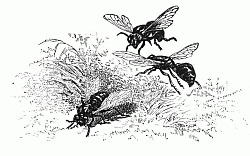
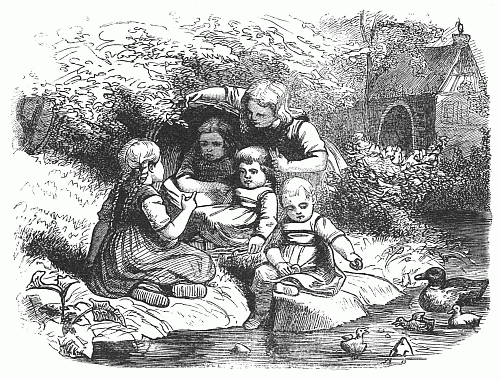
A mild summer day, and one, two, three, four children sitting on the ground by the pond, and feeding the ducks!
But I think I hear the larger girl, who is standing up, say to the sitters, "Children, don't you know better than to sit there on the damp earth? You will every one of you catch a cold. Get up this instant."
That is what the larger girl ought to say; for many children take bad colds by sitting on the grass. The other day, as I went through the Central Park in New York, I saw a maid in charge of three children, one of them an infant, and she was letting them lie at full-length on the grass.
I told her she must not do so; but she said the weather was warm, and there was no danger. As I knew the parents of the children, I told her she must take the children up at once, and let them sit on the seats near by.[101]
At length she obeyed me. Two days afterwards I called on the parents of the children, and then learned that every one of the little ones was ill with a cold. I told the mother what I had seen at the Central Park and she told the maid that never again must she let the children sit on the bare grass. The maid promised she would not do so again.
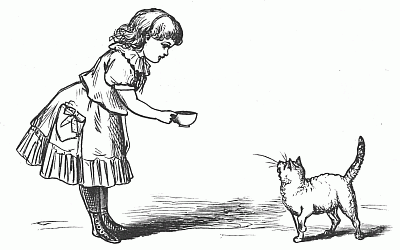
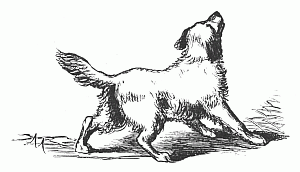
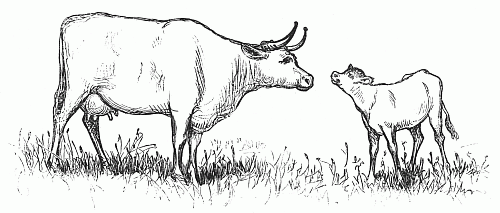
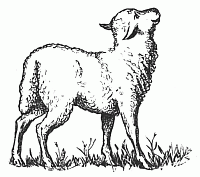
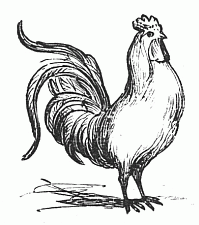
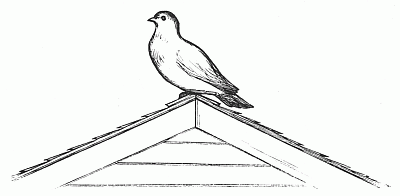
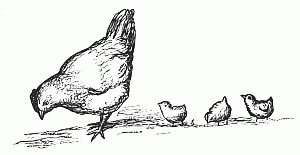
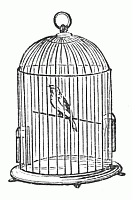
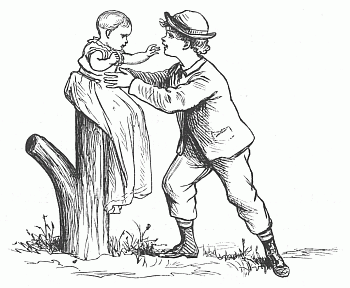
Did you ever go chestnut-gathering? Such fun as it is! especially when a lot of girls and boys go together.
On one of my father's farms there were many chestnut-trees; and every autumn, after the first frost, when the leaves were all turning, and beginning to fall, we used to have chestnut-gatherings.
The boys used to get long poles, with which they would beat off the nuts. Sometimes they would climb the trees, and shake or beat off such nuts as they could not reach from below. And we girls used to help pick them up, and put them into baskets.
Some years chestnuts are very scarce. I remember one year there was only one tree that had any nuts on; and we could not reach them: not even a man could climb it.
One day, Henry, who was a very kind man, said, "Perhaps we will cut that tree down: it will make good rails, and then you children can get all the nuts."
We no sooner heard this than we gave him no peace till it was done. And such an event! For we were to see the tree cut down.
We children were stationed far away from danger; and another man and Henry chopped and chopped, till it was almost ready to fall, when they stepped back, and, in less than a minute, there was such a whistling through the air, such a crashing, and breaking of branches, and then a loud thud!
The tree was down. I felt quite breathless with excitement; and so did the others; for it was some minutes before we ran up to see how many nuts there were.
Oh, such lots! all spread around, and beaten out of the prickly burrs, all ready for us. I cannot remember how[105] many we gathered, but it was some bushels; and we could not take all that day: so we concluded to return the next afternoon after school.
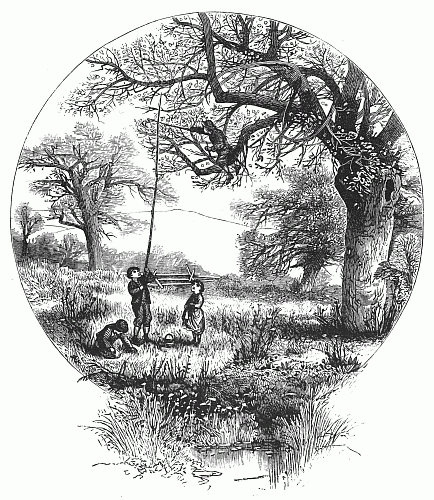
And what do you think? When we got there, not a nut was to be found! The little squirrels had been busy in our absence, and had taken away every one of them. Saucy squirrels! But we did not grudge them the nuts; for we had plenty.
I Want to tell the young folks who read "The Nursery" something of my visit to Florida last winter. We first went to Jacksonville, which lies on the St. John's River, and is a very pleasant city. I wish you would find it on the map.
One day, as I sat in the reading-room of the hotel, I heard shouts of laughter, followed by the clapping of hands. "What can it be?" thought I, throwing down the newspaper I was reading, and running into the corridor.
There I saw five or six little reptiles, about half the length of my arm, that seemed to be running a race over the canvas carpet with which the floor was covered. A number of people were looking on. They appeared to be highly amused by the queer movements of the creatures.[108]
"What are they? Lizards?" cried I.
"Lizards! No: they are young alligators," said a little girl, in a tone that implied pity for my ignorance.
"Alligators!" said I, retreating in alarm, as one of them came towards me.
"Oh, you coward!" cried the little girl, laughing. "They are too small to hurt you. See me." And, saying this, she took one of them up in her apron, and brought it towards me. I ran into the reading-room, and she ran after me; but when she saw that I was really afraid of the reptile, she took it back to the corridor, and placed it on the floor.
These little alligators grow to be huge creatures, sometimes more than twenty feet long. They live in the creeks and little rivers that run into the St. John's. They rarely go very far from the shore. They live partly on land and partly in the water.
In Florida the weather in January is often quite as warm as it is in the Northern States in June. So on a fine winter day, my father took my sister and me on board the steamer "Mayflower" for a trip upon the St. John's River, and up some of the small streams, where alligators may be found.
We went some thirty miles towards the south, and then turned into a small river, where the scenery on both sides resembled that given in the picture. Cypress-swamps and high trees overgrown with moss everywhere met our view. On the banks, and generally on fallen logs, might be seen alligators basking in the sun.
Many of the passengers in the steamboat had brought pistols and guns, with which to fire at the poor alligators. This is a very cruel and useless sport, for the alligators do no harm to anybody. I saw ladies and young girls firing at them. We passed some fifty alligators on our way.[109] Father and another gentleman took a boat, and rowed some distance up a creek. There we saw an alligator with a young one by its side. The young are very small, compared with the full-grown reptile. You can see from the picture, that the alligator is not handsome; but that is no reason why bullets should be lodged in its hide. I came to the conclusion that firing pistols at these animals was poor and mean sport. What a lovely day it was! and how we enjoyed the excursion! Just think of sitting in your summer clothing on a day in January, and passing through scenery where the trees and shrubs are all green. We returned to Jacksonville just in time to see the sun set, and we shall not soon forget our visit among the alligators.
Uncle Charles's Nephew. |
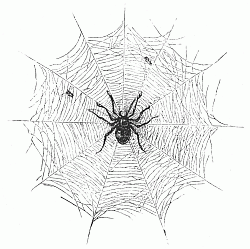
Every child has seen spiders in plenty, spinning their webs in some corner; or, after the web or tent is securely fastened and finished, lying in wait for some unfortunate fly or mosquito.
Oftentimes in these webs small brown bags are to be seen, and these, if opened, will be found to contain a great many little eggs which the spider has laid; or, sometimes when you open them, you will find that the eggs have just hatched, and that there is a bag full of tiny spiders that have not yet seen the light.
Spiders indeed have as many children sometimes as the "Old woman who lived in a shoe;" but, unlike that famed personage, they seem to know just what to do. It is very interesting to watch them, and see how they manage their little ones.
One day as I was walking on a country road, where there was not much travel, my attention was caught by a large spider in the dust at my feet, so large that I stopped to look at it. Its body seemed rough and thick, while its legs were short. I took a stick, and poked it, when, presto change! my spider had a small, round, smooth body, and long legs.
Truly this was more strange than any sleight-of-hand trick I had ever seen. I had heard of snakes and frogs shedding their skins, and many other queer stories of animals and insects, but of nothing at all like this.[111]
I stooped closer to the ground to see if I could get a clew to the mystery, and found that the dust all about the large spider was alive with little ones that she had just shaken off. What a load! And how did they ever get up on her back? Did they run up her slender legs, and crowd and cling on?
How I wished I knew the spider language, that I might find out why this mother weighed herself down with such a burden of little ones as she walked the street! Was she giving them an airing, and showing them the world? or had the broom of some housemaid swept away her web, and forced her thus to take flight to save her family from destruction?
Perhaps she had been burned out. Or was it the first day of May to her? and had her landlord forced her out of her house because she could not pay the rent?
Alas! she could not tell me; and I left her there in the road with all her little ones about her.
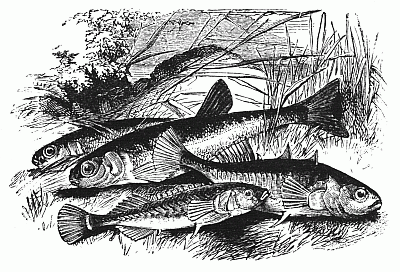
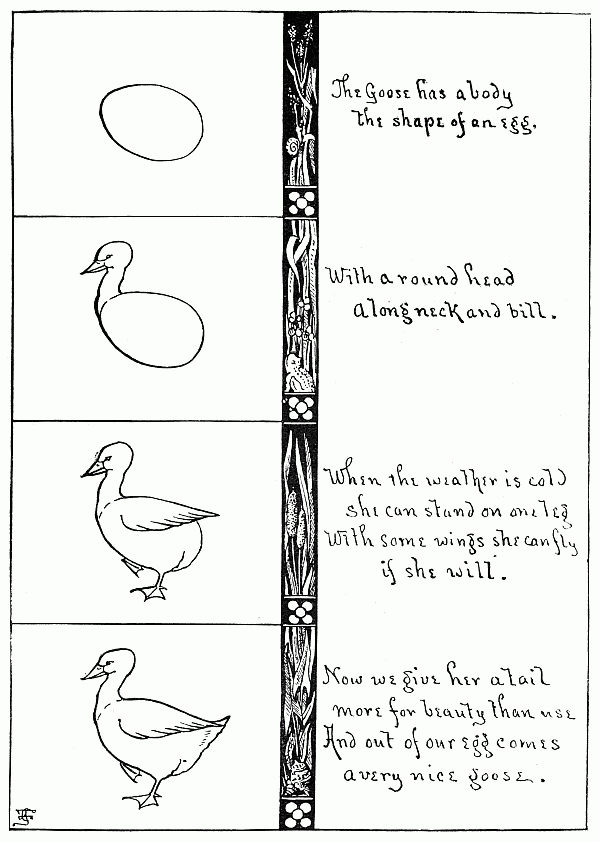
Many years ago, when I was a little fellow, I went on a sail with my Uncle Ralph on one of the prettiest of our northern lakes. The day was fine, the air was mild but fresh, and the hills and banks around us were clothed in green.
Besides Uncle Ralph, in the boat were my Aunt Mary, and cousins Walter and Susan Brent. Uncle Ralph was a sportsman, and he had a gun, with which he hoped to bring down a deer, in case he should see one.
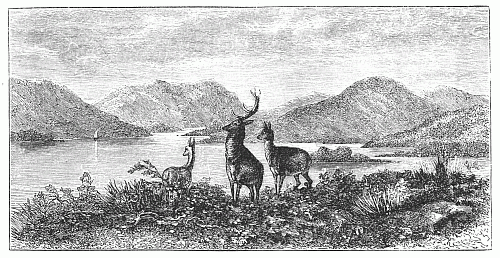
I did not at all like this part of his plan. I knew it would mar my own and my aunt's pleasure, if we were made to see the death of a noble stag or a gentle fawn. But I was too fond of a sail to express my dislike of Uncle Ralph's plan.
At the foot of a hill we stopped in our little boat to pick berries. Aunt Mary said she would stay and read. The rest of us went with Uncle Ralph to a clearing near by, to pick raspberries.[114]
We had not been gone long, when Uncle Ralph sent me back for a mug with which to get water from a cool spring. As I came within sight of the boat, I saw Aunt Mary take the ramrod of the gun, extract the bullet, and then put in fresh wadding, and ram it down.
I understood it all, but said nothing. After we had got berries and water enough, we set sail again, and this time for the opposite shore, where Uncle Ralph's keen eyes had detected a stag and two fawns.
We landed in a little cove out of sight of the deer. Uncle Ralph took his gun, and crept through the woods. In about fifteen minutes we heard him fire. Aunt Mary smiled, and took up her book. Soon Uncle Ralph came back.
"Where's your game, Ralph?" asked Aunt Mary.
"Will you believe it," said he: "I got within thirty feet of them; had the fairest shot that a fellow could possibly have, but somehow I missed my aim—didn't so much as graze one of them."
"Well, I'm not sorry for it," said Aunt Mary. "We shall enjoy our luncheon under the trees all the better."
I looked at her, and laughed, but she checked me with a "Hush!"
Mr. Baxter, a poor laboring-man, was the owner of a fine dog, whose name was Dandy. Having to remove from one village to another in the State of Maine, Mr. Baxter hired a small wagon on which his furniture was packed. Then he led the horse, while Dandy followed behind.
When he came to the place where he was to stop, Mr. Baxter unloaded his wagon, but was sorry to find that a[115] chair and a basket were missing from the back-part of the wagon, and that Dandy, also, could not be found. The day passed; and, as the dog did not appear, the poor man feared that something must have happened to him.
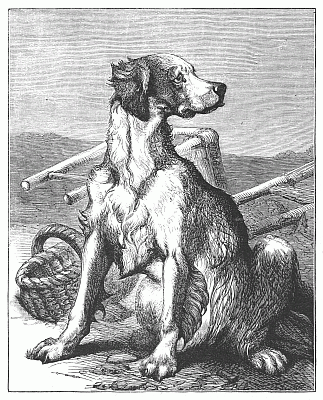
The next day, as Mr. Baxter was on his way back to the old cottage to take away another load, he heard the bark of[116] a dog, which sounded very much like Dandy's. Judge how glad he was when he saw by the roadside, not only his lost property, but his faithful Dandy, seated erect by the chair and basket, keeping strict guard over them.
They had fallen from the wagon when Mr. Baxter was not looking; but Dandy had seen them, and, like a good dog, felt it his duty to stay behind and guard what belonged to his master.
Although left for so long a time without food, the faithful creature had never quitted the spot where the chair and basket had fallen. But, when he saw his master, how glad was poor Dandy! He leaped up, put his paws on the man's shoulders, and barked with joy.
"Good Dandy! good Dandy!" said Mr. Baxter: "you must be hungry, old fellow! Come along: you shall have a good dinner for this. While I have a crust of bread, I'll share it with you, you noble old dog."
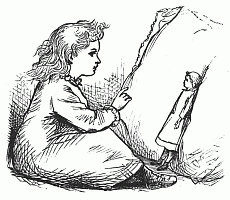
Emma has placed her doll Flora against the pillow. She says, "Now, dear Flora, I want you to be very good to-morrow, for I am to have company. It is my birthday."
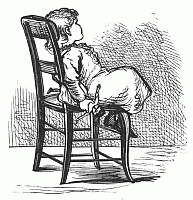
Then Emma sat down in a chair, and said to herself, "Why, what an old person I shall be! I shall be four years old; and I shall have to go to school soon, and read in my books. I love to look at the pictures now."
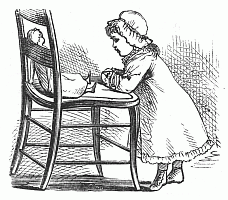
Emma got down from the chair, and placed Flora in it, and said: "I want you to be very still now, my child, for I am going to say my evening prayers. You must not cry; you must not stir; for I shall not like it at all if you make the least noise."
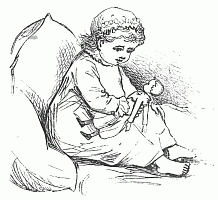
Then Emma said her prayers, and Flora kept quite still all the while. "Now I shall take off my shoes, and get into bed," said Emma; and then she thanked Flora for behaving so well.
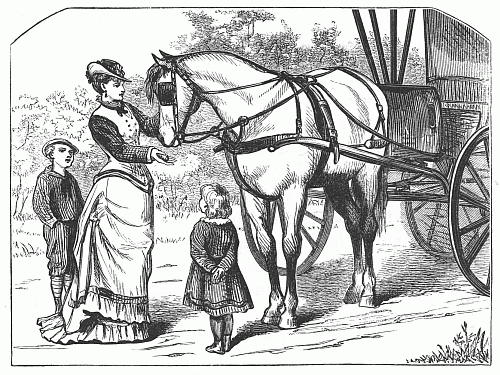
We call him old Billy; but he is not really old: he is a young horse, and as full of capers as any puppy. After he has been standing in the barn for two or three days, he acts like a wild creature when he is taken out, and will whisk round corners, and scamper up and down the hill, as if he really meant to tear every thing to pieces. But just fill the carriage up with ladies or babies, and he will step along as carefully as if he thought an extra joggle would break some of them.
He is very fond of my aunt, who usually drives him; and, when she goes to ride, he always expects her to give him something good,—an apple, or a crust, or a lump of sugar. If she has nothing for him, he will grab the corner of her veil, or the ribbons on her hat, and chew them, to teach[120] her not to forget him next time; and he will lap her face and hands, like a dog.
If she goes into a store, and stays longer than he thinks necessary, he will step across the sidewalk, carriage and all, and try to get his head in at the door to look for her.
There is another horse in the barn where he is kept,—a very quiet, well-behaved nag, named Tom; and sometimes, when Billy feels naughty, he will put his head over the side of the stall and nip Tom, not enough to hurt much, but just enough to tease him, and make him squeal.
One day auntie heard a great clattering in the barn, and went out to see what was the matter. When she opened the door, both horses were in their stalls, and all was quiet. She noticed that the meal-chest was open: so she closed it, and went out. Before she reached the house, the noise began again, and she went quietly back, and peeped in at the window.
There was Billy, dipping his nose into the meal-chest, which he had opened. "Billy, what are you doing?" said auntie; and it was fun enough to see him whisk into his stall, and stand there as quiet and demure as a cat that had just been caught eating up the cream.
Billy had slipped the halter, and so set himself free. Since then he has been fastened more securely; yet he still succeeds in freeing himself once in a while.
The cuckoo is a queer bird. It arrives in England about the middle of April, and departs in the autumn for the woods of Northern Africa. In every language the well-known notes of the male bird have suggested its name.[121]
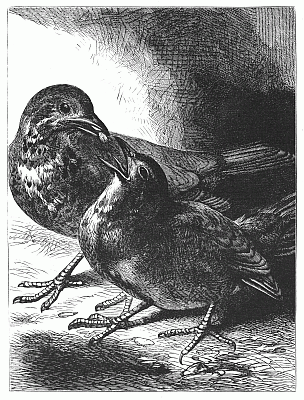
In its habits it is shy; and its voice may be often heard whilst the eye seeks in vain to find the bird itself. Its food consists of caterpillars and various insects.
The female cuckoo makes no nest, and takes no care of[122] her young. How do you suppose she does? Having a wide bill, she takes up in it one of her eggs, which she puts in the nest of some other bird that feeds on insects.
The strange nurses to whom the cuckoo confides her young become not only good mothers to them, but neglect their own children to take care of the young cuckoos.
As the young cuckoo thrives and grows strong, he thrusts the other birds out of the nest, so that he may have all the room to himself. For five weeks or more his adopted mother supplies him with food.
In the picture a thrush is represented as feeding a young cuckoo, that has probably driven off all the thrush's own children.
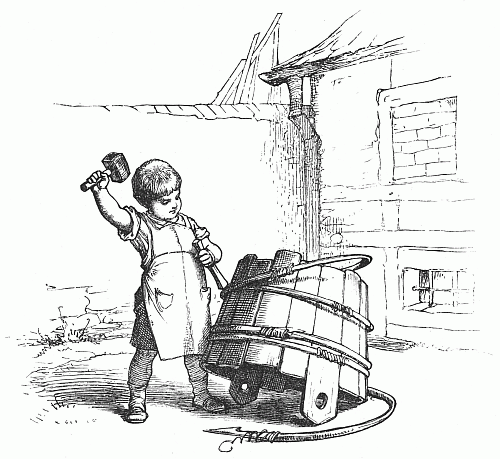
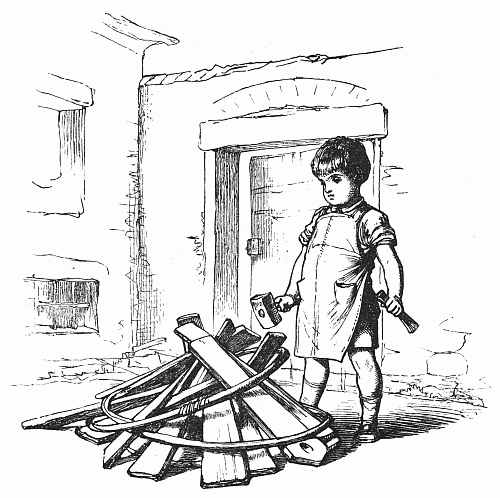
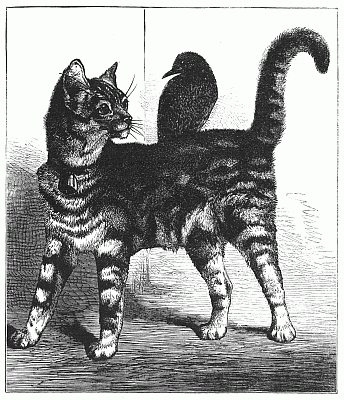
The European starling is a sprightly and handsome bird, about eight inches long, of a black color with purple and greenish reflections, and spotted with buff. It may be taught to repeat a few words, and to whistle short tunes.
A little boy in England, who had one as a pet, which he named Dicky, tells the following story about it:[126]—
"I took it home with me, and got a cage for it. But Master Dicky was not satisfied with so little room, and got out, and took possession of the whole house. One morning I was awakened by his chirping, and, on looking around, I saw him on my pillow, to which he used to come every morning.
"We had at the same time a cat, with whom he soon became very good friends. They always drank milk out of the same saucer. One afternoon, a basin of milk being on the table, Master Dicky thought he would take a bath: so in he went, splashing the milk all over the table.
"Sometimes he would take it into his head to have a ride on the cat's back, to which she had no objection. At night he would sleep with the cat and kitten; and once when the servant came down in the morning, she said that she saw the cat with her paw around the bird, keeping him warm, though that seems almost too much to believe."
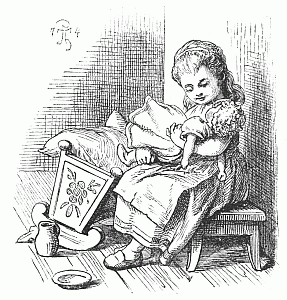
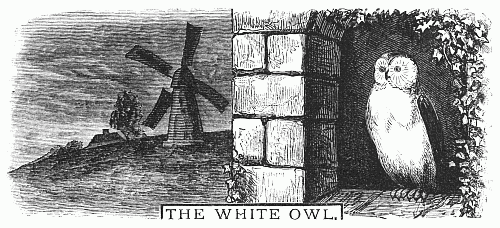
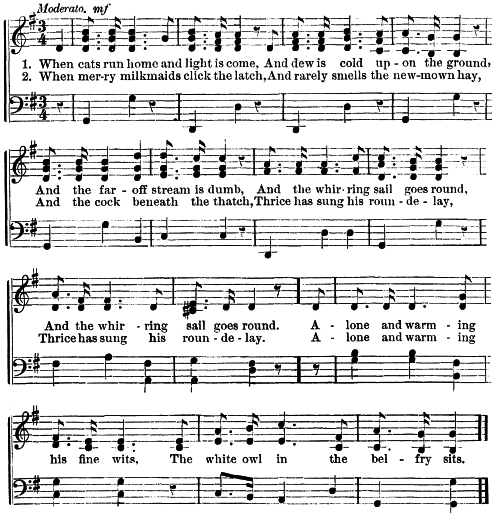
The July edition of the Nursery had a table of contents for the next six issues of the year. This table was divided to cover each specific issue. A title page copied from this same July edition was also used for this number and the issue number added after the Volume number.
Page 114, "go" changed to "got" (After we had got)
Page 128, period changed to a comma on chorus of song (his fine wits,)